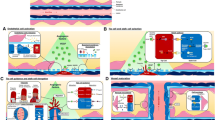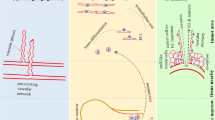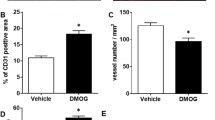Abstract
Tumor growth relies on formation of a vascular supply. In 1971, Judah Folkman was the first to propose that in order to grow beyond 2–3 mm in size tumors required a new vascular network [16]. Subsequent research has confirmed that growth of a tumor, both at the primary site and metastases, is dependent on neoangiogenesis [17, 24]. This development of a new vasculature, angiogenesis, is normally regulated by both activators and inhibitors (Table 18.1). Tumors can produce some of these activators or down-regulate expression of inhibitors, therefore altering the balance in favor of an “angiogenic switch” [23]. In addition, the tumor-associated blood vessels differ from normal blood vessels in a number of ways: the capillary network is not organized, loose perivascular cells lead to a leaky basement membrane and tumor cells may become integrated into the new blood vessel [2]. There is recent evidence to suggest that anti-angiogenic therapy may also alter the abnormal tumor blood supply resulting in blood vessels which are more normal, allowing for improved tumor perfusion and better delivery of chemotherapy [34].
Access this chapter
Tax calculation will be finalised at checkout
Purchases are for personal use only
Similar content being viewed by others
References
Beaudry P, Force J, Naumov GN, Wang A, Baker CH, Ryan A et al (2005) Differential effects of vascular endothelial growth factor receptor-2 inhibitor zd6474 on circulating endothelial progenitors and mature circulating endothelial cells: implications for use as a surrogate marker of antiangiogenic activity. Clin Cancer Res 11(9): 3514–3522
Bergers G, Benjamin LE (2003) Tumorigenesis and the angiogenic switch. Nat Rev Cancer 3(6):401–410
Bevacizumab (Avastin). [package insert] (April, 2004) Genentech, San Francisco, CA
Bocci G, Francia G, Man S, Lawler J, Kerbel RS (2003) Thrombospondin 1, a mediator of the antiangiogenic effects of low-dose metronomic chemotherapy. Proc Natl Acad Sci USA 100(22):12917–12922
Browder T, Butterfield CE, Kraling BM, Shi B, Marshall B, O’Reilly MS et al (2000) Antiangiogenic scheduling of chemotherapy improves efficacy against experimental drug-resistant cancer. Cancer Res 60(7):1878–1886
Burstein HJ, Spigel D, Kindsvogel K, Parker LM, Bunnell CA, Partridge AH et al (2005) Metronomic chemotherapy with and without bevacizumab for advanced breast cancer: a randomized phase II study. Breast Cancer Res Treat, San Antonio Breast Cancer Symposium 94, S1:4 (abst)
Colleoni M, Rocca A, Sandri MT, Zorzino L, Masci G, Nole F et al (2002) Low-dose oral methotrexate and cyclophosphamide in metastatic breast cancer: antitumor activity and correlation with vascular endothelial growth factor levels. Ann Oncol 13(1):73–80
Drevs J, Hofmann I, Hugenschmidt H, Wittig C, Madjar H, Muller M et al (2000) Effects of ptk787/zk 222584, a specific inhibitor of vascular endothelial growth factor receptor tyrosine kinases, on primary tumor, metastasis, vessel density, and blood flow in a murine renal cell carcinoma model. Cancer Res 60(17):4819–4824
Drevs J, Zirrgiebel U, Schmidt-Gersbach CI, Mross K, Medinger M, Lee L et al (2005) Soluble markers for the assessment of biological activity with ptk787/zk 222584 (ptk/zk), a vascular endothelial growth factor receptor (VEGFR) tyrosine kinase inhibitor in patients with advanced colorectal cancer from two phase I trials. Ann Oncol 16(4):558–565
Dupont J, Schwartz L, Koutcher J, Spriggs D, Gordon M, Mendelson D et al (2004) Phase I and pharmacokinetic study of VEGF trap administered subcutaneously(sc) to patients with advanced solid malignancies. J Clin Oncol, Proc Annu Meet Am Soc Clin Oncol 23:3009(abst)
Escudier B, Szczylik C, Eisen T, Stadler WM, Schwartz B, Shan M et al (2005) Randomized phase III trial of the Raf kinase and VEGFR inhibitor sorafenib (bay 43–9006) in patients with advanced renal cell carcinoma. J Clin Oncol, Proc Annu Meet Am Soc Clin Oncol 23, LBA4510 (abst)
Ferrara N. (2004) Vascular endothelial growth factor as a target for anticancer therapy. Oncologist 9(Suppl 1):2–10
Ferrara N, Gerber HP, LeCouter J (2003) The biology of VEGF and its receptors. Nat Med 9(6):669–676
Fine BA, Valente PT, Feinstein GI, Dey T (2000) VEGF, flt-1, and kdr/flk-1 as prognostic indicators in endometrial carcinoma. Gynecol Oncol 76(1):33–39
Foekens JA, Peters HA, Grebenchtchikov N, Look MP, Meijer-van Gelder ME, Geurts-Moespot A et al (2001) High tumor levels of vascular endothelial growth factor predict poor response to systemic therapy in advanced breast cancer. Cancer Res 61(14):5407–5414
Folkman J (1971) Tumor angiogenesis: therapeutic implications. N Engl J Med 285(21):1182–1186
Folkman J (1995) Angiogenesis in cancer, vascular, rheumatoid and other disease. Nat Med 1(1):27–31
Gasparini G, Toi M, Gion M, Verderio P, Dittadi R, Hanatani M et al (1997) Prognostic significance of vascular endothelial growth factor protein in node-negative breast carcinoma. J Natl Cancer Inst 89(2):139–147
Giantonio BJ, Catalano PJ, Meropol NJ, O’Dwyer PJ, Mitchell EP, Alberts SR et al (2005) High-dose bevacizumab imporves survival when combined with folfox4 in previously treated advanced colorectal cancer: results from the eastern cooperative oncology group (ecog) study e3200. J Clin Oncol, Proc Annu Meet Am Soc Clin Oncol 23:2 (abst)
Gordon MS, Margolin K, Talpaz M, Sledge GW Jr, Holmgren E, Benjamin R et al (2001) Phase I safety and pharmacokinetic study of recombinant human anti-vascular endothelial growth factor in patients with advanced cancer. J Clin Oncol 19(3):843–850
Hainsworth JD, Sosman JA, Spigel DR, Edwards DL, Baughman C, Greco A (2005) Treatment of metastatic renal cell carcinoma with a combination of bevacizumab and erlotinib. J Clin Oncol 23(31):7889–7896
Hanahan D, Bergers G, Bergsland E (2000) Less is more, regularly: metronomic dosing of cytotoxic drugs can target tumor angiogenesis in mice. J Clin Invest 105(8): 1045–1047
Hanahan D, Folkman J (1996) Patterns and emerging mechanisms of the angiogenic switch during tumorigenesis. Cell 86(3):353–364
Hanahan D, Weinberg RA (2000) The hallmarks of cancer. Cell 100(1):57–70
Harada Y, Ogata Y, Shirouzu K (2001) Expression of vascular endothelial growth factor and its receptor kdr (kinase domain-containing receptor)/flk-1 (fetal liver kinase-1) as prognostic factors in human colorectal cancer. Int J Clin Oncol 6(5):221–228
Hecht JR, Trarbach T, Jaeger E, Hainsworth J, Wolff R, Lloyd K et al (2005) A randomized, double-blind, placebo-controlled, phase III study in patients with metastatic adenocarcinoma of the colon ore rectum receiving first-line chemotherapy with oxaliplatin/5-fluorouracil/leucovorin and ptk787/zk 222584 or placebo (confirm-1). J Clin Oncol, Proc Annu Meet Am Soc Clin Oncol 23, LBA 3 (abst)
Heymach JV, Johnson BE, Rowbottom JA, Fidias P, Lu C, Prager D et al (2005) A randomized, placebo-controlled phase II trial of zd6474 plus docetaxel, in patients with nsclc. J Clin Oncol, Proc Annu Meet Am Soc Clin Oncol 23:3023 (abst)
Holash J, Davis S, Papadopoulos N, Croll SD, Ho L, Russell M et al (2002) VEGF-trap: a VEGF blocker with potent antitumor effects. Proc Natl Acad Sci USA 99(17):11393–11398
Holden SN, Eckhardt SG, Basser R, de Boer R, Rischin D, Green M et al (2005) Clinical evaluation of zd6474, an orally active inhibitor of VEGF and EGF receptor signaling, in patients with solid, malignant tumors. Ann Oncol 16(8):1391–1397
Holden SN, Ryan E, Kearns A, Holmgren E, Hurwitz H (2005) Benefit from bevacizumab (bv) is independent of pretreatment plasma vascular endothelial growth factor-a (VEGF-a) in patients with metastatic colorectal cancer. J Clin Oncol, Proc Annu Meet Am Soc Clin Oncol 23:3555 (abst)
Hurwitz H, Fehrenbacher L, Novotny W, Cartwright T, Hainsworth J, Heim W et al (2004) Bevacizumab plus irinotecan, fluorouracil, and leucovorin for metastatic colorectal cancer. N Engl J Med 350(23):2335–2342
Hurwitz HI, Fehrenbacher L, Hainsworth JD, Heim W, Berlin J, Holmgren E et al (2005) Bevacizumab in combination with fluorouracil and leucovorin: an active regimen for first-line metastatic colorectal cancer. J Clin Oncol 23(15):3502–3508
Inai T, Mancuso M, Hashizume H, Baffert F, Haskell A, Baluk P et al (2004) Inhibition of vascular endothelial growth factor (VEGF) signaling in cancer causes loss of endothelial fenestrations, regression of tumor vessels, and appearance of basement membrane ghosts. Am J Pathol 165(1):35–52
Jain RK (2005) Normalization of tumor vasculature: an emerging concept in antiangiogenic therapy. Science 307(5706):58–62
Johnson DH, Fehrenbacher L, Novotny WF, Herbst RS, Nemunaitis JJ, Jablons DM et al (2004) Randomized phase II trial comparing bevacizumab plus carboplatin and paclitaxel with carboplatin and paclitaxel alone in previously untreated locally advanced or metastatic non-small-cell lung cancer. J Clin Oncol 22(11):2184–2191
Jubb AM, Hurwitz HI, Bai W, Holmgren EB, Tobin P, Guerrero AS et al (2006) Impact of vascular endothelial growth factor-a expression, thrombospondin-2 expression, and microvessel density on the treatment effect of bevacizumab in metastatic colorectal cancer. J Clin Oncol 24(2):217–227
Juttner S, Wissmann C, Jons T, Vieth M, Hertel J, Gretschel S et al (2006) Vascular endothelial growth factor-d and its receptor VEGFR-3: two novel independent prognostic markers in gastric adenocarcinoma. J Clin Oncol 24(2):228–240
Kabbinavar F, Hurwitz HI, Fehrenbacher L, Meropol NJ, Novotny WF, Lieberman G et al (2003) Phase II, randomized trial comparing bevacizumab plus fluorouracil (fu)/leucovorin (lv) with fu/lv alone in patients with metastatic colorectal cancer. J Clin Oncol 21(1):60–65
Kilickap S, Abali H, Celik I. (2003) Bevacizumab, bleeding, thrombosis, and warfarin. J Clin Oncol 21(18):3542; author reply 3543
Kim ES, Serur A, Huang J, Manley CA, McCrudden KW, Frischer JS et al (2002) Potent VEGF blockade causes regression of coopted vessels in a model of neuroblastoma. Proc Natl Acad Sci USA 99(17):11399–11404
Kim KJ, Li B, Winer J, Armanini M, Gillett N, Phillips HS et al (1993) Inhibition of vascular endothelial growth factor-induced angiogenesis suppresses tumour growth in vivo. Nature 362(6423):841–844
Kindler HL, Friberg G, Singh DA, Locker G, Nattam S, Kozloff M et al (2005) Phase II trial of bevacizumab plus gemcitabine in patients with advanced pancreatic cancer. J Clin Oncol 23(31):8033–8040
Kupsch P, Henning BF, Passarge K, Richly H, Wiesemann K, Hilger RA et al (2005) Results of a phase I trial of sorafenib (bay 43–9006) in combination with oxaliplatin in patients with refractory solid tumors, including colorectal cancer. Clin Colorectal Cancer 5(3):188–196
Millauer B, Longhi MP, Plate KH, Shawver LK, Risau W, Ullrich A et al (1996) Dominant-negative inhibition of flk-1 suppresses the growth of many tumor types in vivo. Cancer Res 56(7):1615–1620
Miller KD, Chap LI, Holmes FA, Cobleigh MA, Marcom PK, Fehrenbacher L et al (2005) Randomized phase III trial of capecitabine compared with bevacizumab plus capecitabine in patients with previously treated metastatic breast cancer. J Clin Oncol 23(4):792–799
Miller KD, Trigo JM, Wheeler C, Barge A, Rowbottom J, Sledge G et al (2005) A multicenter phase II trial of zd6474, a vascular endothelial growth factor receptor-2 and epidermal growth factor receptor tyrosine kinase inhibitor, in patients with previously treated metastatic breast cancer. Clin Cancer Res 11(9):3369–3376
Miller KD, Wang M, Gralow J, Dickler M, Cobleigh MA, Perez EA et al (2005) A randomized phase III trial of paclitaxel versus paclitaxel plus bevacizumab as first-line therapy for locally recurrent or metastatic breast cancer: a trial coordinated by the eastern cooperative oncology group (e2100). Breast Cancer Res Treat, San Antonio Breast Cancer Symposium 94, S1:3 (abst)
Morgan B, Thomas AL, Drevs J, Hennig J, Buchert M, Jivan A et al (2003) Dynamic contrast-enhanced magnetic resonance imaging as a biomarker for the pharmacological response of ptk787/zk 222584, an inhibitor of the vascular endothelial growth factor receptor tyrosine kinases, in patients with advanced colorectal cancer and liver metastases: results from two phase I studies. J Clin Oncol 21(21):3955–3964
Mross K, Drevs J, Muller M, Medinger M, Marme D, Hennig J et al (2005) Phase I clinical and pharmacokinetic study of ptk/zk, a multiple VEGF receptor inhibitor, in patients with liver metastases from solid tumours. Eur J Cancer 41(9):1291–1299
Neufeld G, Cohen T, Gengrinovitch S, Poltorak Z (1999) Vascular endothelial growth factor (VEGF) and its receptors. Faseb J 13(1):9–22
Padro T, Bieker R, Ruiz S, Steins M, Retzlaff S, Burger H et al (2002) Overexpression of vascular endothelial growth factor (VEGF) and its cellular receptor kdr (VEGFR-2) in the bone marrow of patients with acute myeloid leukemia. Leukemia 16(7):1302–1310
Prewett M, Huber J, Li Y, Santiago A, O’Connor W, King K et al (1999) Antivascular endothelial growth factor receptor (fetal liver kinase 1) monoclonal antibody inhibits tumor angiogenesis and growth of several mouse and human tumors. Cancer Res 59(20):5209–5218
Ratain MJ, Eisen T, Stadler WM, Flaherty KT, Gore M, Desai A et al (2005) Final findings from a phase II, placebo-controlled, randomized discontinuation trial of sorafenib (bay 43–9006) in patients with advanced renal cell carcinoma. J Clin Oncol, Proc Annu Meet Am Soc Clin Oncol 23:4544 (abst)
Rich JN, Sathornsumetee S, Keir ST, Kieran MW, Laforme A, Kaipainen A et al (2005) Zd6474, a novel tyrosine kinase inhibitor of vascular endothelial growth factor receptor and epidermal growth factor receptor, inhibits tumor growth of multiple nervous system tumors. Clin Cancer Res 11(22):8145–8157
Sandler AB, Gray R, Brahmer J, Dowlati A, Schiller JH, Perry MC et al (2005) Randomized phase II/III trial of paclitaxel plus carboplatin with or withhout bevacizumab in patients with advanced non-squamous non-small cell lung cancer: an eastern cooperative oncology group (ecog) trial – e4599. J Clin Oncol, Proc Annu Meet Am Soc Clin Oncol 23:4 (abst)
Shaked Y, Emmenegger U, Man S, Cervi D, Bertolini F, Ben-David Y et al (2005) Optimal biologic dose of metronomic chemotherapy regimens is associated with maximum antiangiogenic activity. Blood 106(9):3058–3061
Skillings JR, Johnson DH, Miller K, Kabbinavar F, Bergsland E, Holmgren E et al (2005) Arterial thromboembolic events (ates) in a pooled analysis of 5 randomized, controlled trials of bevacizumab with chemotherapy. J Clin Oncol, Proc Annu Meet Am Soc Clin Oncol 23:3019 (abst)
Skobe M, Brown LF, Tognazzi K, Ganju RK, Dezube BJ, Alitalo K et al (1999) Vascular endothelial growth factor-c (VEGF-c) and its receptors kdr and flt-4 are expressed in aids-associated kaposi’s sarcoma. J Invest Dermatol 113(6):1047–1053
Strumberg D, Richly H, Hilger RA, Schleucher N, Korfee S, Tewes M et al (2005) Phase I clinical and pharmacokinetic study of the novel raf kinase and vascular endothelial growth factor receptor inhibitor bay 43–9006 in patients with advanced refractory solid tumors. J Clin Oncol 23(5):965–972
Tanigawa N, Amaya H, Matsumura M, Shimomatsuya T (1997) Correlation between expression of vascular endothelial growth factor and tumor vascularity, and patient outcome in human gastric carcinoma. J Clin Oncol 15(2):826–832
Thomas AL, Morgan B, Horsfield MA, Higginson A, Kay A, Lee L et al (2005) Phase I study of the safety, tolerability, pharmacokinetics, and pharmacodynamics of ptk787/zk 222584 administered twice daily in patients with advanced cancer. J Clin Oncol
Tong RT, Boucher Y, Kozin SV, Winkler F, Hicklin DJ, Jain RK (2004) Vascular normalization by vascular endothelial growth factor receptor 2 blockade induces a pressure gradient across the vasculature and improves drug penetration in tumors. Cancer Res 64(11):3731–3736
Trarbach T, Schleucher N, Tewes M, Seeber S, Junker U, Laurent D et al (2005) Phase I/II study of ptk787/zk 222584, a novel, oral angiogenesis inhibitor in combination with folfiri as first-line treatment for patients with metastatic colorectal cancer. J Clin Oncol, Proc Annu Meet Am Soc Clin Oncol 23:3605 (abst)
Wedge SR, Ogilvie DJ, Dukes M, Kendrew J, Chester R, Jackson JA et al (2002) Zd6474 inhibits vascular endothelial growth factor signaling, angiogenesis, and tumor growth following oral administration. Cancer Res 62(16):4645–4655
Wildiers H, Guetens G, De Boeck G, Verbeken E, Landuyt B, Landuyt W et al (2003) Effect of antivascular endothelial growth factor treatment on the intratumoral uptake of cpt-11. Br J Cancer 88(12):1979–1986
Wilhelm SM, Carter C, Tang L, Wilkie D, McNabola A, Rong H et al (2004) Bay 43–9006 exhibits broad spectrum oral antitumor activity and targets the raf/mek/erk pathway and receptor tyrosine kinases involved in tumor progression and angiogenesis. Cancer Res 64(19):7099–7109
Willett CG, Boucher Y, di Tomaso E, Duda DG, Munn LL, Tong RT et al (2004) Direct evidence that the VEGF-specific antibody bevacizumab has antivascular effects in human rectal cancer. Nat Med 10(2):145–147
Wood JM, Bold G, Buchdunger E, Cozens R, Ferrari S, Frei J et al (2000) Ptk787/zk 222584, a novel and potent inhibitor of vascular endothelial growth factor receptor tyrosine kinases, impairs vascular endothelial growth factor-induced responses and tumor growth after oral administration. Cancer Res 60(8):2178–2189
Yang JC, Haworth L, Sherry RM, Hwu P, Schwartzentruber DJ, Topalian SL et al (2003) A randomized trial of bevacizumab, an anti-vascular endothelial growth factor antibody, for metastatic renal cancer. N Engl J Med 349(5):427–434
Yano S, Muguruma H, Matsumori Y, Goto H, Nakataki E, Edakuni N et al (2005) Antitumor vascular strategy for controlling experimental metastatic spread of human small-cell lung cancer cells with zd6474 in natural killer cell-depleted severe combined immunodeficient mice. Clin Cancer Res 11(24 Pt 1):8789–8798
Yoshiji H, Gomez DE, Shibuya M, Thorgeirsson UP (1996) Expression of vascular endothelial growth factor, its receptor, and other angiogenic factors in human breast cancer. Cancer Res 56(9):2013–2016
Author information
Authors and Affiliations
Corresponding author
Editor information
Editors and Affiliations
Rights and permissions
Copyright information
© 2011 Springer Science+Business Media B.V.
About this chapter
Cite this chapter
Zakarija, A., Gradishar, W.J. (2011). Inhibitors of Tumor Angiogenesis. In: Minev, B. (eds) Cancer Management in Man: Chemotherapy, Biological Therapy, Hyperthermia and Supporting Measures. Cancer Growth and Progression, vol 13. Springer, Dordrecht. https://doi.org/10.1007/978-90-481-9704-0_18
Download citation
DOI: https://doi.org/10.1007/978-90-481-9704-0_18
Published:
Publisher Name: Springer, Dordrecht
Print ISBN: 978-90-481-9703-3
Online ISBN: 978-90-481-9704-0
eBook Packages: MedicineMedicine (R0)




